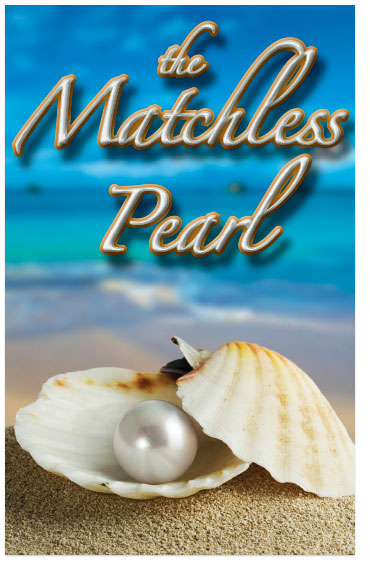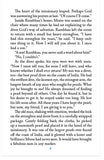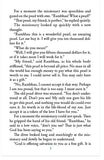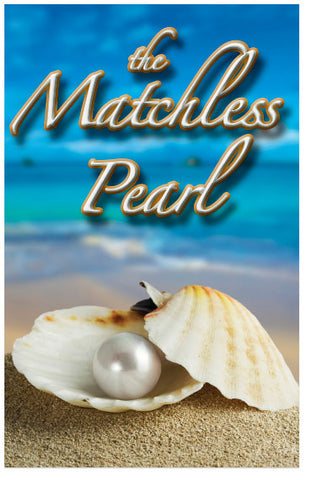The Matchless Pearl (NKJV)
Special-Order Folded Tract
 NOTE: This item is custom-printed to order (click for more details).
NOTE: This item is custom-printed to order (click for more details).
This tract is from our print-on-demand library, and is not kept in stock. Select the options below, and we will custom-print a batch just for you. Because this item is custom-printed, you can add your custom imprint to the back page at no extra cost.
- Estimated shipping date: Thursday, March 26 (Click for more details)
- SKU:
- Discounts: Discount coupons do not apply to this item
- Format: Folded Tract
- Size: 3.5 inches x 5.5 inches
- Pages: 6
- Imprinting: Available with 3 lines of custom text
- Version: NKJV
- Returns: Because this item is custom-printed to order, it cannot be returned.
Show all item details
The full text of this tract is shown below in the NKJV version. (Do you want to print this tract in a different version than the one listed? Contact us and let us know what you're looking for—we may be able to create the alternate version for you at no charge.)
A heavy splash was followed by many ripples and then the water below the pier was still. David Morse, a missionary, crouched low on the pier, his eyes riveted where a stream of little bubbles rose to the surface from deep under the water. In a moment his old friend Rambhau, an Indian pearl diver, appeared and clambered onto the dock, grinning.
“Look at this one, my friend,” said Rambhau, as he took a big oyster from between his teeth. “I think it will be good.”
Morse took it and pried it open with his pocketknife. “Rambhau! Look!” exclaimed Morse, “It’s a treasure!”
“Yes, a good one,” shrugged the diver.
“Good! It’s perfect isn’t it? Have you ever seen a better pearl?” exclaimed Morse, turning the pearl over in his hands.
“Oh, yes, there are better pearls, much better. I have one…” his voice trailed off. “See here – the imperfections – the black speck here, this tiny dent. It’s not even round, but good enough as pearls go.”
“Your eye is too sharp for your good, my friend,” lamented Morse. “I would never ask for a more perfect pearl!”
“It is just as you say about your God,” answered Rambhau. “To themselves people seem without fault, but God sees them as they really are.” The two men started down the dusty road to town.
“You’re right, Rambhau, but God offers a perfect righteousness to all who will simply believe and accept His free offer of salvation through His beloved Son.”
“No, my friend. As I’ve told you so many times, it’s too easy. That is where your religion breaks down. Perhaps I am too proud, but I must work for my place in heaven. Do you see that man over there? He is a pilgrim, perhaps to Bombay or Calcutta. He walks barefooted over the sharpest stones – and see – every few paces he kneels down and kisses the road. That is good. The first day of the new year I shall begin my pilgrimage. All my life I have planned it. I shall make sure of heaven this time. I am going to Delhi on my knees.”
“Rambhau! That’s crazy! It’s nine hundred miles to Delhi! The skin will break on your knees and you will have an infection or disease before you ever get there.”
“No, I must go to Delhi. The suffering will be sweet, for it will purchase heaven for me.”
“Rambhau, my friend, you can’t! How can I let you do this when Jesus Christ, by His death and resurrection, has already done all to purchase heaven for you?”
But the old man could not be moved. “You are my dearest friend on earth. Through many years you have stood beside me. In sickness and want you have often been my only friend. But even you cannot turn me from this great desire to purchase eternal bliss. I must go to Delhi.” It was useless. The old pearl diver could not understand, could not accept the free salvation of Christ.
Later one afternoon Morse answered a knock at his door to find Rambhau there.
“My good friend!” exclaimed Morse. “Come in.”
“No,” said the pearl diver. “I want you to come with me to my house. I have something to show you.”
The heart of the missionary leaped. Perhaps God was answering his prayers at last. “Of course I’ll come.”
Inside Rambhau’s home, Morse was seated on the chair where many times he had sat explaining to the diver God’s way of salvation. Rambhau left the room to return with a small but heavy strongbox. “I have had this strongbox for years,” he said. “I keep only one thing in it. Now I will tell you about it. I once had a son.”
“A son! Rambhau, you never said a word about him!”
“No, I couldn’t.”
As the diver spoke, his eyes were wet with tears. “Now I must tell you, for soon I will leave, and who knows whether I shall ever return? My son was a diver, too – the best pearl diver on the coasts of India. He had the swiftest dive, the keenest eye, the strongest arm, the longest breath of any man who sought for pearls. What joy he brought to me! He always dreamed of finding a pearl beyond all others. One day he found it, but in his desire to get it, he stayed under too long. He lost his life soon after. All these years I have kept the pearl, but now, my friend, I am giving it to you.”
The old man, shaking with emotion, worked the lock on the strongbox and drew from it a carefully wrapped package. Gently folding back the cloths, he picked up a mammoth pearl and placed it in the hand of the missionary. It was one of the largest pearls ever found off the coast of India, and it glowed with a luster and brilliance Morse had never seen. It would have brought a fabulous sum in any market.
For a moment the missionary was speechless and gazed on the pearl with awe. “Rambhau! What a pearl!”
“That pearl, my friend, is perfect,” he replied quietly.
The missionary looked up quickly with a new thought.
“Rambhau this is a wonderful pearl, an amazing pearl. Let me buy it. I will give you ten thousand dollars for it.”
“What do you mean?”
“Well, I will give you fifteen thousand dollars for it, or if it takes more I will work for it.”
“My friend,” said Rambhau, as his whole body stiffened, “this pearl is beyond all price. No man in all the world has enough money to pay what this pearl is worth to me. I could never sell it. You may only have it as a gift.”
“No, Rambhau, I cannot accept it that way. Perhaps I am too proud, but that is too easy. I must earn it.”
The old pearl diver was stunned. “You don’t understand at all. Don’t you see? My only son gave his life to get this pearl, and nothing you would do could ever earn it. Its worth is in the life-blood of my son. Just accept it as a token of the love I have for you.”
For a moment the missionary could not speak. Then he gripped the hand of his old friend. “Rambhau,” he said in a low voice, “don’t you see? That is just what God has been saying to you.”
The diver looked long and searchingly at the missionary and slowly he began to understand.
“God is offering salvation to you as a free gift. It is so great and priceless that no man on earth could buy it – millions of dollars are too little. No man can earn it – in a thousand pilgrimages you could not earn it. It cost God the life-blood of His only Son to make the entrance for you into heaven. All you can do is accept it as a token of God’s love for you, a sinner.”
“Rambhau, of course I will accept the pearl in deep humility, praying that I may be worthy of your love. But won’t you accept God’s great gift of eternal life, in deep humility knowing it cost Him the death of His only Son to offer it to you?”
Great tears were rolling down the face of the old man. The veil was lifting. He understood at last. “I see it now. I could not believe that His salvation was free, but now I understand. Some things are too priceless to be bought or earned. I accept His offer of salvation.”
“God demonstrates His own love toward us, in that while we were still sinners, Christ died for us” (Romans 5:8).
“God so loved the world that He gave His only begotten Son, that whoever believes in Him should not perish but have everlasting life” (John 3:16).
“By grace you have been saved through faith, and that not of yourselves; it is the gift of God, not of works, lest anyone should boast” (Ephesians 2:8-9).













